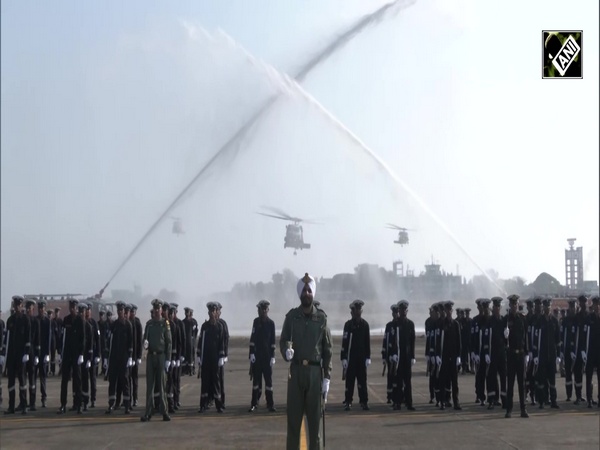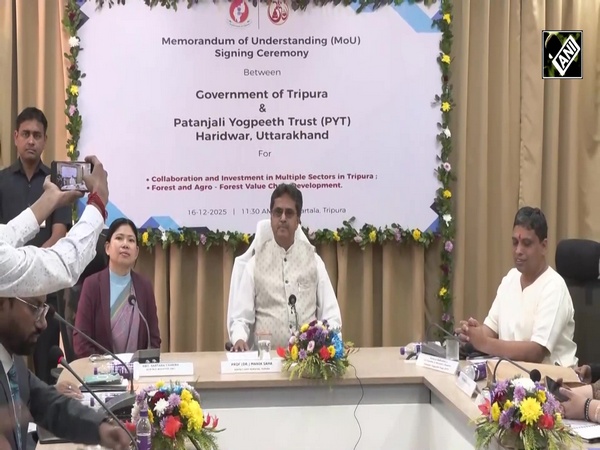Kashmiri fields resound with folk songs as farming season begins
Jun 15, 2023

Srinagar (Jammu and Kashmir) [India], June 15 : As the farming season begins in Kashmir, the fields come alive with the harmonious melodies of traditional folk songs. With the plantation of paddy saplings, locals indulge in a centuries-old tradition of singing folk songs to accompany their laborious work.
This annual ritual not only showcases the cultural heritage of the region but also serves as a reminder of the deep connection between the people of Kashmir and their land.
As the women of Kashmir actively participate in the plantation process, their voices blend with the rustling of the wind and the gentle swaying of the crops, creating an enchanting symphony that resonates across the valley.
As the plantation of paddy saplings continues, the fields of Kashmir become an orchestral landscape, where the melodies of folk songs resonate, echoing the resilience and vibrancy of the farming community. With each passing day, the songs become a constant companion, guiding the farmers through their toil and acting as a reminder of their deep-rooted connection to the land.
As the farming season progresses, these melodies serve as a beacon of hope. The paddy sowing season in Kashmir commences before the arrival of the monsoons, usually in May and goes up to the end of June. This timing is crucial for traditional crops, as they are highly photosensitive and require adequate sunlight for optimal growth. As farmers prepare their fields and meticulously plant paddy saplings, they embrace the cultural legacy of their ancestors by incorporating folk songs into their agricultural practices.
Amidst the laborious task of planting the paddy saplings, a transformation takes place in the fields. The women, with their hands submerged in the soil, find solace and inspiration in the age-old practice of singing folk songs. These melodies, infused with emotions of love, joy, and longing, fill the air, creating an ethereal atmosphere that resonates with the land.
"Singing folk songs while planting paddy saplings has been an integral part of our farming tradition for generations," says Fatima, a local farmer. "It not only makes the work more enjoyable but also serves as a way of honouring our ancestors who toiled on these very fields." She added.
The fields transform into a stage where the timeless melodies of folk songs harmonize with the labour of the farmers. This melodious tradition is carried forward by generations.
"The melodious tunes of our folk songs are like a soothing balm to the weary souls of farmers," remarks Mushtaq, a seasoned farmer. "They infuse us with energy and positivity, helping us overcome the physical demands of our labour-intensive tasks."
For the people of Kashmir, the singing of folk songs during the farming season is not merely a means of entertainment. It is a way of preserving their heritage and nurturing their collective identity. These songs serve as a cultural thread that weaves together the past, present, and future generations, ensuring that the essence of Kashmiri traditions endures.
The folk songs carry the stories of land, struggles, and aspirations. When they sing them, they pay homage to their roots and invoke the blessings for a bountiful harvest.
"The beauty of this practice lies in the unity it fosters among us," shares Gulzar, a young farmer. "When we sing together, our voices merge, creating a sense of camaraderie and shared purpose. It brings us closer to our roots and strengthens our bond with the land."
While both men and women participate in the plantation process, it is the women of Kashmir who play a prominent role in keeping this musical tradition alive. Their voices resonate through the fields as they sing songs that have been sung by their mothers and grandmothers before them. This inclusion of women in agricultural activities not only showcases their resilience but also represents a step towards gender equality, breaking stereotypes and empowering them within their communities.
Beyond their cultural significance, these songs also serve practical purposes. The rhythmic melodies synchronize the movements of the farmers, fostering a sense of camaraderie and enhancing productivity. The songs infuse the laborious task of sowing with renewed vigour, transforming the fields into a stage where the stories of Kashmir unfold through lyrical verses.
The influence of folk songs goes beyond the realms of entertainment; it has a profound impact on the mental well-being of the farming community. The labour-intensive nature of farming can often be physically and emotionally draining. The soothing melodies and rhythmic verses of folk songs provide solace, easing the stress and fatigue associated with arduous tasks. The act of singing together instils a sense of solidarity, motivating the farmers to work cohesively towards a common goal.
















